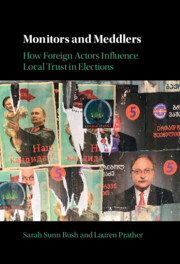Book contents
6 - Intervener Identity
Published online by Cambridge University Press: 28 July 2022
Summary
Chapter 6 focuses on how the effects of foreign interventions depend on the identity of the intervener. It shows that in Tunisia and the United States, the presence of capable and unbiased monitors (not any monitors) increased election credibility. In Georgia, an unusually certain electoral environment, the same was true when the analysis focused only on individuals with significant uncertainty in their beliefs about election credibility. Intriguingly, in Tunisia, the monitors perceived as capable and unbiased were those from the Arab League. Returning to meddlers, Bush and Prather find that most respondents did not believe meddling was likely to affect the election results. If they did believe meddlers were capable, however, then they observe the predicted negative relationship with election credibility. Moreover, in a hypothetical scenario in which a foreign actor successfully meddled in a future election in Georgia, they find the expected decrease in election credibility. This chapter shows how dependent the effects of foreign actors are on beliefs about the actor’s capabilities and biases.
Keywords
- Type
- Chapter
- Information
- Monitors and MeddlersHow Foreign Actors Influence Local Trust in Elections, pp. 177 - 210Publisher: Cambridge University PressPrint publication year: 2022



